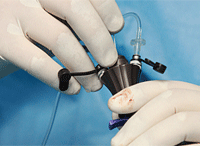Extensive video game playing can reorganize the brain’s basic cortical network and significantly improve hand-eye coordination, according to a study in the October issue of Cortex.
The authors suggest that such cortical reorganization could help experienced gamers more effectively perform complex visuomotor tasks, such as laparoscopic surgery, than non-gamers. The research might even have implications to reverse the negative effects of neurodegenerative diseases, such as Alzheimer’s.
In this study, the authors compared the visuomotor coordination of 13 men in their 20s who played video games for at least four hours a week for the previous three years to that of 13 young men who did not play video games.

People who play video games can better
perform complex hand-eye tasks, such as
laparoscopic surgery.
While sitting inside a functional magnetic resonance imaging (fMRI) machine, the subjects were asked to complete a series of increasingly difficult visuomotor tasks, such as using a joystick and looking in one direction while reaching in another.
Following testing, the authors noted that non-gamers had to rely chiefly upon their parietal cortex (the brain area typically involved in hand-eye coordination) to perform such complex tasking, while the experienced gamers exhibited increased activity in the prefrontal cortex as the front of the brain. The authors concluded that extensive video game play alters the basic cortical network that is used for processing complex, visually-guided tasking.
“By using high-resolution brain imaging, we were able to actually measure which brain areas were activated at a given time during the experiment,” says Lauren E. Sergio, Ph.D., associate professor in the Faculty of Health at York University in Toronto. “We tested how the skills learned from video game experience can transfer over to new tasks, rather than just looking at brain activity while the subject plays a video game.”
Additionally, the authors suggested that these data could help researchers better understand how certain neurodegenerative diseases, such as Alzheimer’s, negatively affect patients’ hand-eye coordination.
For example, if clinicians can instruct an Alzheimer’s patient to practice certain visuomotor skills, it may be possible to stimulate his or her brain to reorganize itself.
Granek JA, Gorbet DJ, Sergio LE. Extensive video-game experience alters cortical networks for complex visuomotor transformations. Cortex. 2010 Oct;46(9):1165-77.

